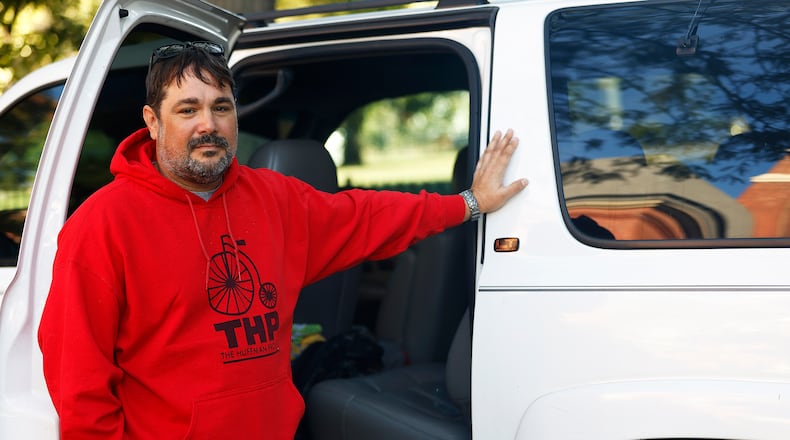Brokschmidt, 46, is the co-founder of The Huffman Project, an organization that helps those who are in active addiction and homeless in the Huffman Historic District.
When the organization began in 2019, it was located in a donated space in the neighborhood where visitors could get counseling, clothing and case management services. For the past two years, however, it has been without an address.
That means that Brokschmidt regularly visits the homeless where he knows they are, passing out bagged lunches and some clothes, while also taking the time to chat with them.
“I pop the hatchback and we’ll sit there and talk,” he said.
The Huffman Project reaches fewer people than it did when it had a dedicated site – Brokschmidt guesses it serves dozens each week rather than the hundreds it once did. He would like to find a new venue to provide meals and services, and he dreams of one day creating an emergency shelter.
In the meantime, he continues to connect with those he serves by drawing from his own experiences.
Brokschmidt, who grew up in the Dayton area, joined the U.S. Air Force when he was 21 and moved to Florida. Not long after that he had kidney surgery, and prescription Percocet led to a heroin addiction.
He was actively addicted for about 16 years, moving back to Ohio and living on the streets for several years. Brokschmidt got help and has been in recovery for about a decade.
His work with The Huffman Project is rewarding, but he also has a personal motivation.
“It’s way more for me than it is for them,” Brokschmidt said. “This is how I keep a needle out of my arm.”
But Heather Cunningham, who nominated Brokschmidt as a Dayton Daily News Community Gem, has watched his drive, dedication and commitment to using his personal experiences to help prevent others from shouldering similar burdens.
She called him a “bridge builder.”
“Billy has a unique gift for really seeing people and meeting them where they’re at – suspending judgement – which is really remarkable,” she said.
Cunningham is the national training director at Think Tank, a Miami Valley-based national nonprofit organization that aims to rethink poverty and partner with those affected by it by offering resources, training and other forms of support.
From sharing his own experiences at a podium to sharing a meal with some of the most vulnerable in the community, Brokschmidt acts with humility and conviction, she said.
Brokschmidt said that telling the homeless whom he serves how he overcame similar situations connects with them more than simply relating what a book says they should do. The book might not be wrong, but his own experiences, like sleeping in the back seat of a two-door vehicle for years, can be more impactful.
“It’s relating, really,” he said.
About the Author
